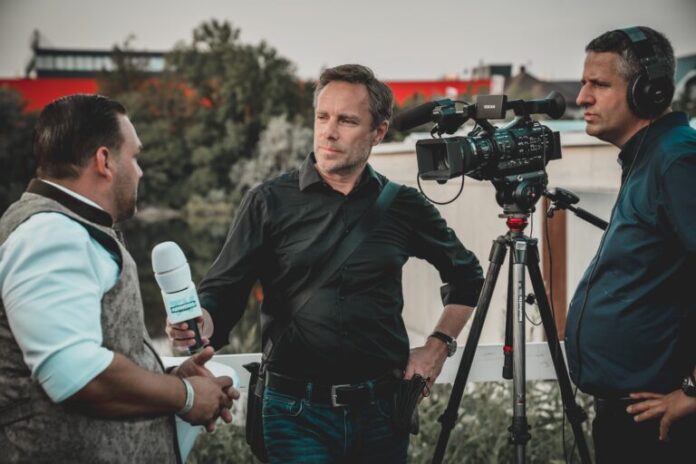Media businesses are investing in digital technology and qualified staff to compete in the inventive and quickly developing UK creative industries.
New business models and income sources, such as subscription-based services and targeted advertising, have emerged due to these investments, aiding media businesses in diversifying their product lines and boosting profitability.
The media business is fascinating, offering opportunities in journalism, entertainment, and product development.
Aspiring professionals should develop their portfolios and networks as soon as possible to stay competitive.
This could be accomplished by starting personal initiatives, giving back to the community, and participating in conferences and seminars.
How To Start Your Career In The Media Industry?
Having training or credentials in a field linked to media might offer you an advantage when applying for jobs in the sector.
Networking opportunities and real-world experience through internships or freelancing work can help you stand out and improve your resume.
Including this on your resume will increase your alternatives.
Here are the initial steps that you must take to strengthen your journey in the media:
- Studying for a degree in a media-related field, such as:
- Advertising.
- TV and film.
- Journalism.
- Broadcasting.
- Marketing.
- Radio production.
- Enrolling in a media apprenticeship to gain work-based training.
- Putting together a portfolio of work.
Getting into running or looking for job experience are the two most popular methods to begin a career in media.
Finding career prospects and getting exposure to various industry fields may be facilitated by networking with industry experts and attending media events.
In order to be competitive in the ever-changing media landscape, it is critical to keep up with industry trends and innovations.
Know Your Options
The media industry provides creative options, from presenting radio programs to developing material as a copywriter.
There are many ways to be creative in the media, from generating material to entertaining viewers.
Here are some of the options you can opt for:
- Copywriter.
- Video Editor.
- Public Relations Manager.
- Radio Broadcaster.
- Digital Marketer
- Media Researcher.
An excellent career choice, media is a diversified field with lots of chances to work for startups, cooperatives, and organisations.
Tips To Make Your Job Hunt Stronger
You need to get heard to make your place in the media industry.
Media in the UK has several roles, positions, and jobs that pay well. All you have to do is take the right steps to streamline your interests and put your potential at the forefront.
Given below are some of the greatest tips that will help you make your job hunt stronger and provide recruiters with a clear idea of your potential—
1. Create Your Digital Portfolio
It’s crucial to show off excellent abilities in visual communication while creating a creative portfolio.
Also, it is crucial to make sure the portfolio is customised for the particular field or position you seek and that it contains a range of work demonstrating your flexibility and breadth as a creative professional.
Consider adopting a website domain that includes your real name in some way to provide a professional image to prospective employers.
Your area of expertise will influence the information presented on the website, and it is a fantastic place to put your video resume.
Also, adding a blog area to your website may assist in showcasing your subject-matter experience and enthusiasm.
2. Create Vlogs
Vlogging is a type of content creation gaining popularity, particularly among young viewers. It is the video sharing of subjects, ideas, and opinions.
Starting as a vlogger can help you hone your video editing and public speaking abilities while showcasing your aptitude for figuring out what your audience wants and how to provide it best.
To make a career, vloggers require a camera, editing software, and internet connectivity, but their digital skills can help them land graduate media employment in entry-level positions.
3. Make Your Blog
Blogging is useful for enhancing your voice, writing style, and editing. It is a frequently updated website with a casual, conversational writing style focusing on an intriguing subject.
Writing your pieces will teach you how to make your writing more concise and reader-friendly.
You can use Google Analytics and SEO (search engine optimization) to track a blog’s effectiveness. Moreover, with the rise of social media, you can find much exposure when you share your blogs on these platforms.
Regular blogging has several advantages, including networking with other creatives who share your interests and opening doors to career and internship prospects.
All this can increase the likelihood that media companies would hire interns who have previously established themselves online.
4. Create Your Podcast Channel
A podcast is a series that is available on demand, delivered in the manner of a radio broadcast, and that may be downloaded from websites like Podbean or BuzzSprout.
It is a simple approach to acquiring useful experience in a subject where work experience opportunities are becoming more difficult to find.
All you need to get started is a computer with a built-in microphone, internet connectivity, and concepts or a theme for your podcast.
Create a podcast to hone skills necessary for a career as a radio host, including technology, audio editing, scriptwriting, audience growth, and engagement.
To engage listeners and make the experience more pleasurable, centre your podcast around a subject you are enthusiastic about.

| [donate]
| Help keep news FREE for our readersSupporting your local community newspaper/online news outlet is crucial now more than ever. If you believe in independent journalism,then consider making a valuable contribution by making a one-time or monthly donation. We operate in rural areas where providing unbiased news can be challenging. |















